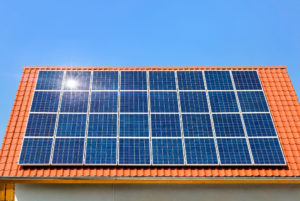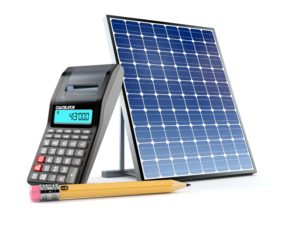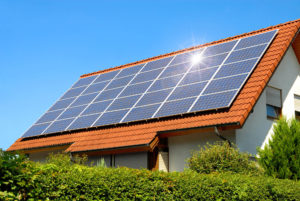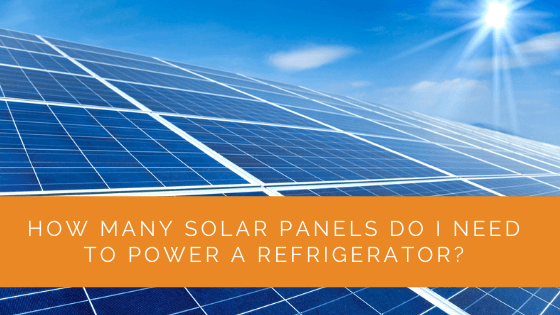Are you tired of hefty electricity bills? Want to shift to solar energy instead? It can be a great move as solar panels will cut down your bills and give you some mental peace. Harnessing the power of the sun, you can run most of your appliances, like the refrigerator.
As this bulky box keeps your food fresh, it contributes to a large part of your power bills. So, you might want to power that up using solar energy.
But you may have this question in mind: how many solar panels to run a refrigerator? Typically, you might need 2,3, or 4 solar panels to power a refrigerator. This post will talk about the amount of solar power you need for the device and how to calculate it.
Contents
- 1 Key Takeaways
- 2 Is Running a Refrigerator on Solar Energy a Good Idea?
- 3 Steps to Calculate Solar Power Consumption of a Fridge
- 4 Other Devices You Need to Focus For Powering Your Fridge
- 5 How Long Will a 12 volt Battery Run a Refrigerator?
- 6 Case Study: Powering a Refrigerator with Solar Panels
- 7 Expert Insights From Our Solar Panel Installers About Powering a Refrigerator with Solar Panels
- 8 Experience Solar Excellence with Us!
- 9 Wrap Up
Key Takeaways
- Running a refrigerator on solar energy is a cost-effective and environmentally friendly option that can reduce electricity bills and extend the appliance’s lifespan.
- To determine how many solar panels are needed to power a refrigerator, you should calculate the refrigerator’s wattage requirements, consider the energy produced by solar panels, and account for factors like battery capacity, solar charge controllers, and inverters.
- Solar panels alone may not power a refrigerator continuously, so batteries are essential to store solar energy for use during nighttime or cloudy days, ensuring 24/7 operation.
Is Running a Refrigerator on Solar Energy a Good Idea?
Running a refrigerator on solar energy is indeed a good idea. It helps to cut down your bills, saves energy, and in many cases, increases the lifespan of your refrigerator.
If you choose an on-grid solar panel system, running your refrigerator don’t be difficult. All you have to do is contact your local solar power company or provider and inform them about the number of appliances in your house.
They will analyze your total power consumption and install the system. As the system will utilize the local utility grid for electrical backup, your refrigerator will always be turned on.
On the other hand, if you choose to install an off-grid solar panel system, you have to do all the hard work yourself.
You have to determine how much solar power you will need, the kilowatt hours, the charge controller required for power consumption and the required number of batteries.

Steps to Calculate Solar Power Consumption of a Fridge
If you want to know the amount of solar power and the number of panels you need to run your fridge, you must go step by step. You need to figure out refrigerator watts and running watts.
Let’s check out the steps in a bit more detail.
Calculating the Refrigerator Watts
You first need to understand how much power your refrigerator requires to work. For that, you have to determine the wattage rating of the device, which will need its amps and volts. Check the product details or the labels to find this information.
After that, you have to multiply both values, i.e., Amps x Volts= Wattage Rating. That’s a good start!
The value will give you the approximate watts needed to run your fridge. Sometimes, these devices might need more power to get started than to run.
Find out the starting wattage of your refrigerator by multiplying the value you figured out above with 1.5. So, Amps x Volts X 1.5= Starting Wattage.
Calculating Running Wattage
To find the running wattage, you can make use of the annual kWh per year value of the device. The information must be present on the energy rating label of the refrigerator. Or, you can search online using the refrigerator’s model number to figure it out.
This value varies, and it can be from 200 to 600 kWh. After you have found the value, divide it by 365 to get the kWh per day.
Then, divide this value by 24 and multiply it by 1000 to get the running kilowatt hours per day. Now, you have a brief idea about how much power your refrigerator consumes. The final value might be startling!
Finding Out the Energy Produced by your Solar Panels
You now have to figure out how much power your solar panels actually produce. We are talking about watts, so the exact figure will depend upon many factors.
These include the arrangement of solar panels, climatic conditions, how many solar panels you’ve installed, and their quality.
On average, most residential solar panels produce approximately 250 watts of power during summer, when there’s maximum sunlight. For instance, if your solar panels produce 250 watts for 4 hours/day, the calculation will look like this,
250 x 4/1000= 1 kWh
If you can’t calculate this figure, you can contact the solar power retailer or an experienced solar panel user to know more.

Determining the Number of Solar Panels You Need
So, you now know the wattage used by your refrigerator and the energy produced by the solar panels. You just need to divide both these values. As a result, you’ll understand how many solar panels are needed to run a refrigerator.
For example, if your fridge uses 3 kilowatt hours per day and the solar panel generates 1 kilowatt hours per day, the resultant value will be,
3/1= 3.
So, the number of solar panels you need to power your refrigerator will be 3.
Other Devices You Need to Focus For Powering Your Fridge
So, you figured out the number of solar panels needed to power that fridge? It’s not yet time to rejoice, as solar panels can’t power your fridge all the time. As solar panels work only during the day, they can charge your fridge while absorbing sunlight.
What about nighttime when they don’t receive the required hours of sunlight? You need to use batteries, inverters, and charge controllers to keep your beloved refrigerator running 24×7. Let’s take a closer look at these devices.
Batteries
You need to have a small battery installed along with a solar panel system to store the solar energy. So, when the sun goes down, you can use the battery to power up your refrigerator. However, you have to make sure the solar panels batteries can handle the electrical load without stopping.
Keep these pointers in mind –
- You might come across 12V, 24V, or even 48V batteries. But to run a refrigerator, the standard battery for an average refrigerator is 12 volt.
- You need to determine the battery amp hours. It is the measure of your selected battery’s capacity and how long it will power the fridge.
- Also, make sure that the batteries and the solar panels are compatible for best results.
- The batteries should store enough power to run a refrigerator even on cloudy days with less sunshine.
So, if your refrigerator runs at 300 kWh per day, you have to multiply it by 24 hours to get the watts per day. In this case, the value will be 300 x 24/1000 = 7200 kilowatt hours. Then, you can determine the required amperes this way,
7200 Wh/12v=600 amp hour
This means that you need a 12 volt 600 amp hour battery for your good ol’ refrigerator.
Solar Panel
No matter the type of solar system you choose, the solar panel will hold the key to your refrigeration. You have already seen the process of calculating how many solar panels you’ll need, but the energy consumption is also important.
Average solar panels generate 30 to 40 kWh of power every month. If we consider your solar panel produces 40 kWh/ month, and your fridge’s watts per hour is 120,
120/40= 3
It means that the number of solar panels you need is 3 for your freezer. However, this number may vary as per the watts per hour rating of the refrigerator and panels.
You can either install the panels yourself or get additional assistance. But this is the most important part of powering your fridge, so invest sufficient time to get it right.
Solar Charge Controller
A solar charge controller will protect your solar panel system by handling the charge properly. By regulation, the flow of solar energy from the panels to batteries keeps everything in order. So, you have to pick a quality solar charge controller to prevent the system from overcharging.
There are many options, such as 12 volts, 24 volts, and 36 volts for solar charge controllers. You can pick one according to your electrical devices. You will most likely come across these two types of controllers –
- MPPT (Maximum PowerPoint Tracking) Charge Controller – Efficiently controls voltage flowing from the panels and transfers it to the battery bank quickly
- PWM (Pulse-Width Modulation) Charge Controller – It is a little more economical than MPPT but suffers huge power loss during energy conversion
So, you can go for an MPPT solar charge controller for its efficiency and performance. But it is a bit expensive, thanks to all the pros. You get what you pay for!
Having a solar charge controller by your side also maintains your solar system’s safety. It will also keep your refrigerator healthy by preventing sudden voltage fluctuations.

Inverter
To add another layer of safety and ensuring your fridge runs non-stop, you need an inverter. In addition, you have to connect the solar panels to both a battery and an inverter to power the fridge 24 hours a day.
You need to pick an inverter that can handle twice the power as per your maximum electrical load. For example, if your refrigerator needs 1 kWh per day, a 2000 W inverter will work just fine.
Many users also prefer an inverter having the same voltage as their battery bank.
How Long Will a 12 volt Battery Run a Refrigerator?
A battery bank in a solar system usually takes around 6 to 8 hours to get fully charged under direct sunlight. So, a 12 volt 50 amp hour lead acid battery (flooded) along with an inverter having 1500 watts can power a refrigerator for approximately 11 to 12 minutes. Here, the battery may be 50% charged.
When the battery is 100% charged, it can power a refrigerator for almost 21 to 24 minutes. However, also understand that –
- A 12 volt 50 Ah battery will be enough to power a two cubic ft 12V refrigerator for almost 35 -50 hours before getting drained.
- This battery can run a 10 cubic ft refrigerator for an RV for 10 to 15 hours uninterrupted.
- You also need to factor in the battery capacity and energy consumption of the refrigerator.
The efficiency of lead-acid and a lithium-ion battery also affects the fridge’s runtime.
Case Study: Powering a Refrigerator with Solar Panels
Background
At Solar Panels Network USA, we pride ourselves on providing tailored solar energy solutions that meet our clients’ specific needs. One common query we receive is about using solar panels to power essential household appliances, particularly refrigerators. This case study explores a project where we successfully implemented an off-grid solar solution to power a refrigerator, showcasing our expertise and the effectiveness of our approach.
Project Overview
A client approached us wanting to reduce their electricity bills by using solar energy to power their refrigerator. They expressed interest in an off-grid system, ensuring their refrigerator could run independently of the local utility grid. Our objective was to design a solar solution that would reliably power the refrigerator 24/7, even during nighttime and cloudy days.
Implementation
We began by conducting a detailed energy audit of the client’s refrigerator to determine its wattage and daily energy consumption. Using this data, we calculated the necessary solar panel capacity. The refrigerator required 300 kWh per day, translating to the need for a robust solar setup.
Our team installed high-efficiency solar panels capable of generating 250 watts each, optimized to capture maximum sunlight. Given the refrigerator’s energy demands, we determined that four solar panels would be sufficient. To ensure continuous operation, we integrated a 12V 600 amp-hour battery system, which would store excess solar energy for use during the night and on cloudy days.
We also installed an MPPT (Maximum PowerPoint Tracking) charge controller to manage the flow of energy from the solar panels to the batteries, preventing overcharging and optimizing energy transfer. An inverter was added to convert the stored DC power from the batteries to AC power, suitable for the refrigerator.
Results
The system was rigorously tested over several weeks. It consistently powered the refrigerator, even during extended periods of low sunlight. The client reported a significant reduction in their electricity bills and appreciated the seamless transition to using solar energy. The off-grid setup proved to be a reliable and sustainable solution, aligning perfectly with their energy-saving goals.
Summary
This project underscores the viability and benefits of using solar panels to power household appliances like refrigerators. By accurately assessing the refrigerator’s energy needs and implementing a well-designed solar system, we ensured continuous, eco-friendly operation. Solar Panels Network USA remains committed to helping clients achieve energy independence and sustainability through innovative solar solutions. Our expertise in solar technology and personalized approach ensures optimal results for each unique project.
Expert Insights From Our Solar Panel Installers About Powering a Refrigerator with Solar Panels
As an experienced solar installer, I can attest to the efficiency and sustainability of using solar panels to power household appliances like refrigerators. The key is to accurately calculate the refrigerator’s wattage requirements and ensure your solar setup includes adequate battery storage for nighttime use.
Senior Solar Technician
Installing an off-grid solar system for your refrigerator can seem daunting, but with proper planning and quality components, it’s entirely achievable. The combination of solar panels, batteries, inverters, and charge controllers ensures a consistent power supply, even on cloudy days.
Solar Installation Expert
Using solar energy to power a refrigerator not only reduces electricity bills but also supports a more eco-friendly lifestyle. The process involves understanding the energy consumption of your fridge and matching it with the output of your solar panels, a task that our team is well-versed in.
Lead Solar Engineer
Experience Solar Excellence with Us!
Trust in Solar Panels Network USA, where our seasoned experts deliver top-quality solar solutions for homes and businesses nationwide. With a legacy of countless successful installations and a commitment to sustainable energy, we’re your reliable partner in the solar journey. Ready for a brighter, eco-friendly future? Call us now at (855) 427-0058 and harness the power of the sun!
Wrap Up
By now, you must have a clear idea about how many solar panels and how much energy you need to power your fridge. Apart from the factors discussed here, the refrigerator’s capacity and solar panel’s quality also matters a lot.
You also have to consider how much solar power you’re using to light up other appliances. Getting a solar-powered refrigerator is also a great alternative!
If your refrigerator is the only device powered by the sun, then you’ll have a merry time cutting down electricity bills!
About the Author
Solar Panels Network USA stands at the forefront of solar energy solutions, driven by a team of seasoned solar engineers and energy consultants. With over decades of experience in delivering high-quality solar installations and maintenance, we are committed to promoting sustainable energy through customer-centric, tailored solutions. Our articles reflect this commitment, crafted collaboratively by experts to provide accurate, up-to-date insights into solar technology, ensuring our readers are well-informed and empowered in their solar energy decisions.

